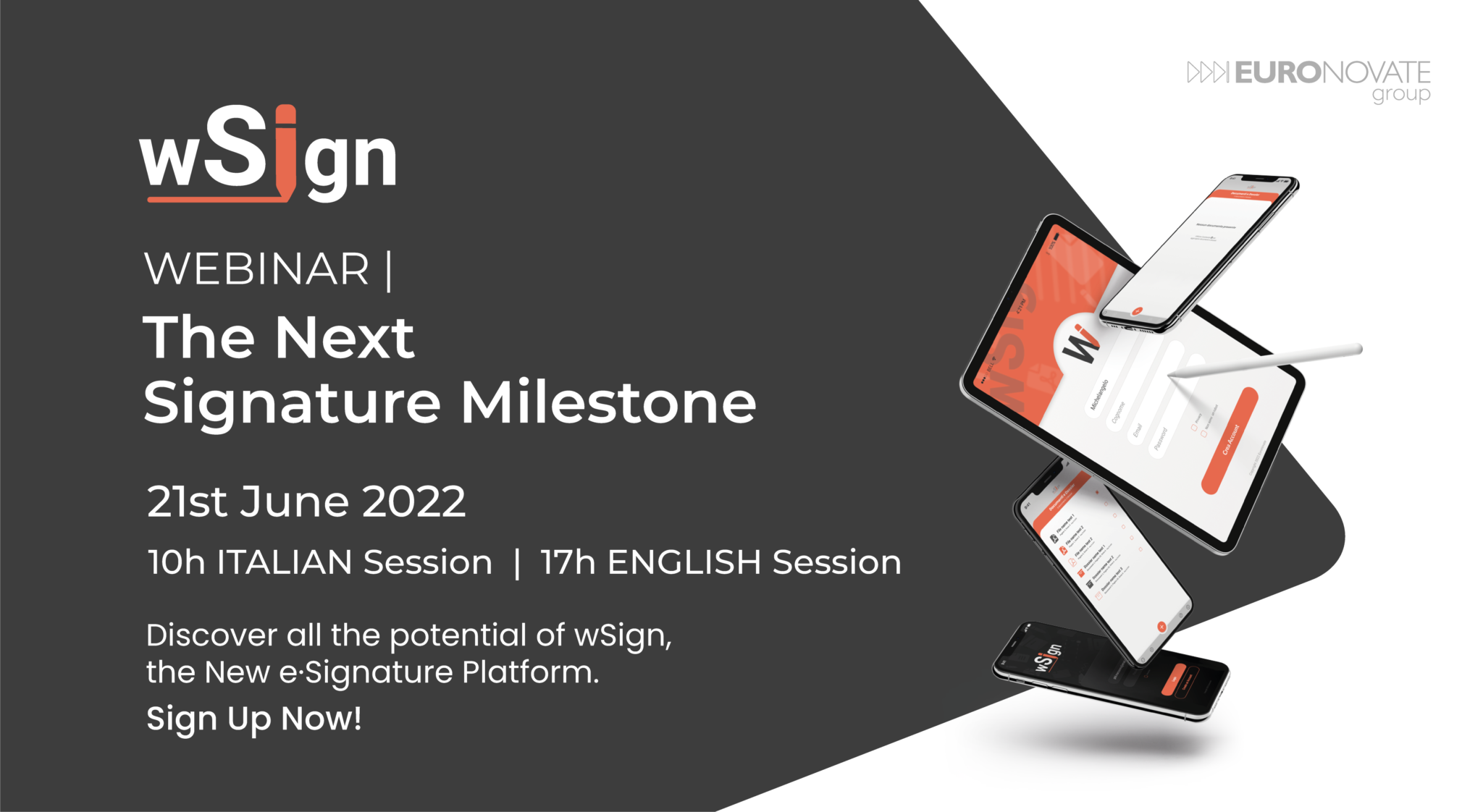Interview with Carlo Di Giulio understanding wSign’s digital signature
Interview by Giovanni Natalini published in techbusiness, 11/07/2022
A legal and digital certification is increasingly important in many business processes. Euronovate Group presented wSign platform for user-friendly digital signature. To describe it, we spoke with Carlo Di Giulio, Product Owner. Here is what emerged from the interview.
wSign's digital signature
"wSign is first an electronic signature tool, and for this reason it aims to satisfy the first need you expect from a platform of this type: to sign documents." Di Giulio explains to us. In just four steps the platform allows one to sign online, obtaining a document with full legal validity and maximum protection.
Among the features of the wSign signature we find:
- Safety, thanks to the high traceability of processes;
- Speed, with 85% of agreements completed in less than 24 hours and 48% in less than 15 minutes;
- Sustainability, with the elimination of costs related to paper documents;
- Compliance with various legal requirements and the European eIDAS regulation;
- Practicality, as it requires just a few clicks.
Thinking about the customer
But how did this set of features come about? “We developed them from our experience with clients of different types and with different needs, being them professionals, small or large companies. The result was to hide any complexity in defining the details of the signature flow which in other products on the market are a must for the user, has rarely been used in practice. "
By doing so, we have drastically simplified the user experience to improve intuitiveness and process speed. However, this does not mean that wSign is less powerful and effective. There is complexity, but it must be sought for specific needs or customization ".
Security and flexibility
As we have seen, simply does not mean not powerful, but it also does not mean unsafe.
"We immediately gave particular importance to the technological architecture and its robustness. We implemented various authentication solutions such as simple authentication via OTP email and SMS. Integrating other signature methods such as biometrics or digital certificates has already begun. "
Flexibility is also fundamental: “wSign can be used in the cloud as a multi-tenant solution, allowing a large margin in customizations and ensuring the segregation of the data of each customer organization. For those who are not yet convinced of the cloud solution, wSign is easily installed on-premise. "
"Another element that contributes to making wSign user-friendliness is certainly the possibility of integrating the platform via REST API into any system already in use by the organization. This, therefore, generates a minimal, if not non-existent, deviation from everyday operations to which users are used to. "
A glance at technology
Let's go into the details of the various digital signature methods available with wSign. There are three in all. The first is a simple authorization click. "This is the ideal type of signature for all documents that do not require a particular strength of the signature, but which still require some kind of evidence [...] and takes only a few seconds to complete". Identification via email address is enough to trace the signature in the system logs. The log is accompanied by identifying information such as the device and browser used.
“If you want to add a security piece, you can add an authorization step by entering an OTP via email or SMS, effectively creating a double authentication factor. In any case, whether they are simple signatures or with OTP, in correspondence with each signature field, wSign adds a qualified seal by the PAdES standard to guarantee the integrity of the operation and the immutability of the signed document."
Use Cases
In which use cases is wSign useful for business processes? “l would say that we can particularly highlight HR processes dematerialization, such as employment contracts or certificates relating to training courses. Other examples are preliminary contracts in the real estate sector, where speed and simplicity are indispensable. Similarly, we can mention the procurement area in both public and private organizations, completely dematerializing document flows with external suppliers. Or in the same way those of internal authorization, allows the signature of multiple internal and external subjects, to be brought back into a single flow, avoiding unnecessary and costly recirculation and processing steps in terms of time and resources. "
“These are just a few examples, but there are many more concrete cases. Basically we are talking about all cases in which an authorization or a signature with formal value is required. Precisely in this sense, eIDAS legislation plays an essential role. In fact, it allows us to extend the use of the platform for cross-border signatures, in the case of relationships with external parties in Europe. Our intention is to move more and more towards signature compatibility in wSign to embrace recognized international standards."
"Among these, I would mention the rules dictated by the Cloud Signature Consortium to extend the platform used to remote signatures compatible with the standard and ensure their recognition and effectiveness. Finally, again to evolve online to the general framework of eIDAS, SPID will soon become one of the possible ways of identifying and accessing wSign. By leveraging a national identity scheme recognized in Europe, we will give further guarantees on the quality and level of trust that the platform ensures "
Share this
You May Also Like
These Related Stories

Euronovate announces wSign, the innovative Digital Signature Platform
.png)
Electronic signature, interview with Carlo Di Giulio

